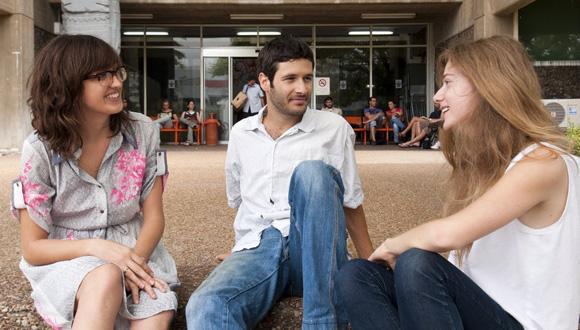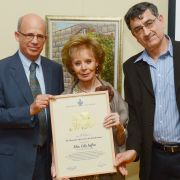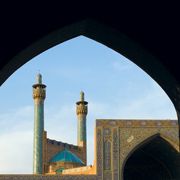Rejuvenating the Arts
You need a good grounding in music, history and philosophy to grasp the shift from classical to Romantic music and a strong knowledge of philosophy and literature to conduct a Nietzschian reading of Shay Agnon. It’s this type of broad, interdisciplinary exploration that is the hallmark of TAU’s Marc Rich Honors Program in the Humanities and Arts, a unique program providing a concentration in both fields of study at the undergraduate level.
The program is a joint initiative of Prof. Shlomo Biderman, former Dean of the Lester and Sally Entin Faculty of Humanities, and Prof. Hannah Naveh, Dean of the Yolanda and David Katz Faculty of Arts. Now entering its fifth year of operation, the program was designed to redress the declining status of the arts and humanities in society in recent years and reestablish these concentrations as crucial fields of relevance to students. The program is in line with – and even preceded – recent recommendations by a special committee of academic representatives and business people to increase the number of excellence programs in the arts and humanities at Israeli institutions of higher education.
“This is a degree program with a mission,” states program head Dr. Iris Milner, a Hebrew literature expert. “We take about 20 highly intelligent and motivated students each year and expose them to the widest possible scope of disciplines in arts and humanities, while also nurturing them towards advanced research,” says Milner. “Our aim is to develop a cadre of researchers and thinkers in the liberal arts.”
Value system
The program’s initiators also see it as a way of contributing to tikkun olam in Israel. “By reinstating the value placed upon humanities and arts we are ultimately bringing about positive and profound change in the Israeli value system,” says Dean of Arts Prof. Hannah Naveh.
These lofty ideals are in line with the aspirations of program graduate Reuel Shualy, 30. Reuel took the program out of a desire to make a real change in Israeli society, particularly in the field of education. Reuel, a combat helicopter pilot who fought in the Second Lebanon War, believes that a broad knowledge of culture is essential to understanding humankind. He hopes this understanding will guide him toward a meaningful leadership position in society, perhaps as a school principal.
Reuel grew up in the southern Negev town of Mitzpe Ramon, one of ten siblings in a secular family. His parents, ex-kibbutzniks, moved there out of ideological reasons to settle the Negev. He attended high school in Sde Boker at a school specializing in environmental and field studies, but also developed a love of reading and writing poetry at an early age.
Like other students in the program, Reuel took two study clusters from each faculty, for a total of four: cinema, theater, philosophy and literature. “All four are separate languages that speak to one another,” he says. “Knowing Nietzsche helps me understand the concept of tragedy in the theater, for example. In the end, all art speaks about life. Cinema does it through the screen; theater, on stage; and philosophy speaks about humans through literature and writing.”
High or low art?
“I don’t believe in high art or low art,” says Reuel. “There is complex art. I prefer complex art which reflects the wider realities and talks about universal issues away from everyday matters.”
Among the first crop of 24 students to graduate last year was Hen Roznek, 26, who is now incorporating the interdisciplinary knowledge she gained in the program into master’s studies at the Department of Geography and Human Environment. For her study clusters in the BA program, Hen combined history and psychoanalysis together
with cinema and general arts studies. In the army she served as a cultural correspondent for the popular IDF radio station, and thus launched a career in journalism at an early stage. It was this interest in culture that tipped the scales in favor of the Rich Program, says Hen.
Hen took courses in a wide range of subjects including bible, architecture, Buddhism and feminism, among others, but history was always dominant for her, she says. She wrote three seminar papers on cinema in the First World War. “I needed a strong background in history and cinema to be able to give an historical perspective,” she says. For Hen the added value of the program was belonging to a special group within the university. “Students in the program stick together, study together and attend enrichment activities together, including museum visits, opera, meetings with intellectuals and artists, and architectural tours,” she says.
Cultural connections
While Hen pushes on with her career as a journalist, program graduate Toam Semel, 24, feels she gained from the program’s abundant possibilities. Hailing from a family of art curators, Toam believes that the place of culture in our lives is of paramount importance. “Everything boils down to culture eventually,” she says. “Even when it comes to friendships, most of the time we connect to people because of their artistic preferences. From these connections we see how art reflects life.” Toam believes that the program – which for her involved studying philosophy, psychoanalysis and linguistics together with cinema and music – enables students to keep processing ideas. “You can keep growing and experimenting with new ideas and areas. It’s not, say, psychology, where you learn a fixed profession,” she says.
From film to bible
Or Cohen, 28, a program graduate, studied in the film track at high school and wanted to pursue film studies at university. He was attracted to the program because it offered him wider choices. By his second year, he began drifting away from film toward Bible and Hebrew studies. “I began reading the bible auto-didactically during the army and connecting to Jewish history,” he says. “Maybe I was looking for my roots, for the basics.” Or believes that all students in Israel should pursue liberal arts degrees before proceeding on to professional degrees. “Before you professionalize you haveto have the basics in order to think critically.”
Reuel says that the Rich Program allows students to choose from so many departments. “I have done courses in East Asian studies, philosophy, theater, art, film, history and in my third year I started to connect eastern philosophy with Ancient Near East studies. One of the questions that concerned me was how to apply Michael Foucault’s theory of sexuality to the hero in the ancient Mesopotamian Epic of Gilgamesh.”
If all this seems like a supermarket of ideas Dr. Milner stresses that the program is highly structured and provides close guidance to the students. “We want them to experiment, but we don’t want them to get lost,” she says. “We accompany them closely and make sure they choose and concentrate in the right fields for them.”
The program is funded by the Marc Rich Foundation for Education, Culture and Welfare, a Swiss foundation based in Lucerne, with offices in Tel Aviv and Switzerland. The foundation supports a wide range of initiatives in Israel and internationally. Its founder, Marc Rich, a major TAU benefactor, received a TAU honorary doctorate in 2009 in recognition of his extensive philanthropic activities. The Marc Rich Foundation also supports doctoral fellowships at TAU. The Managing Director ofthe Foundation is Avner Azulay.





